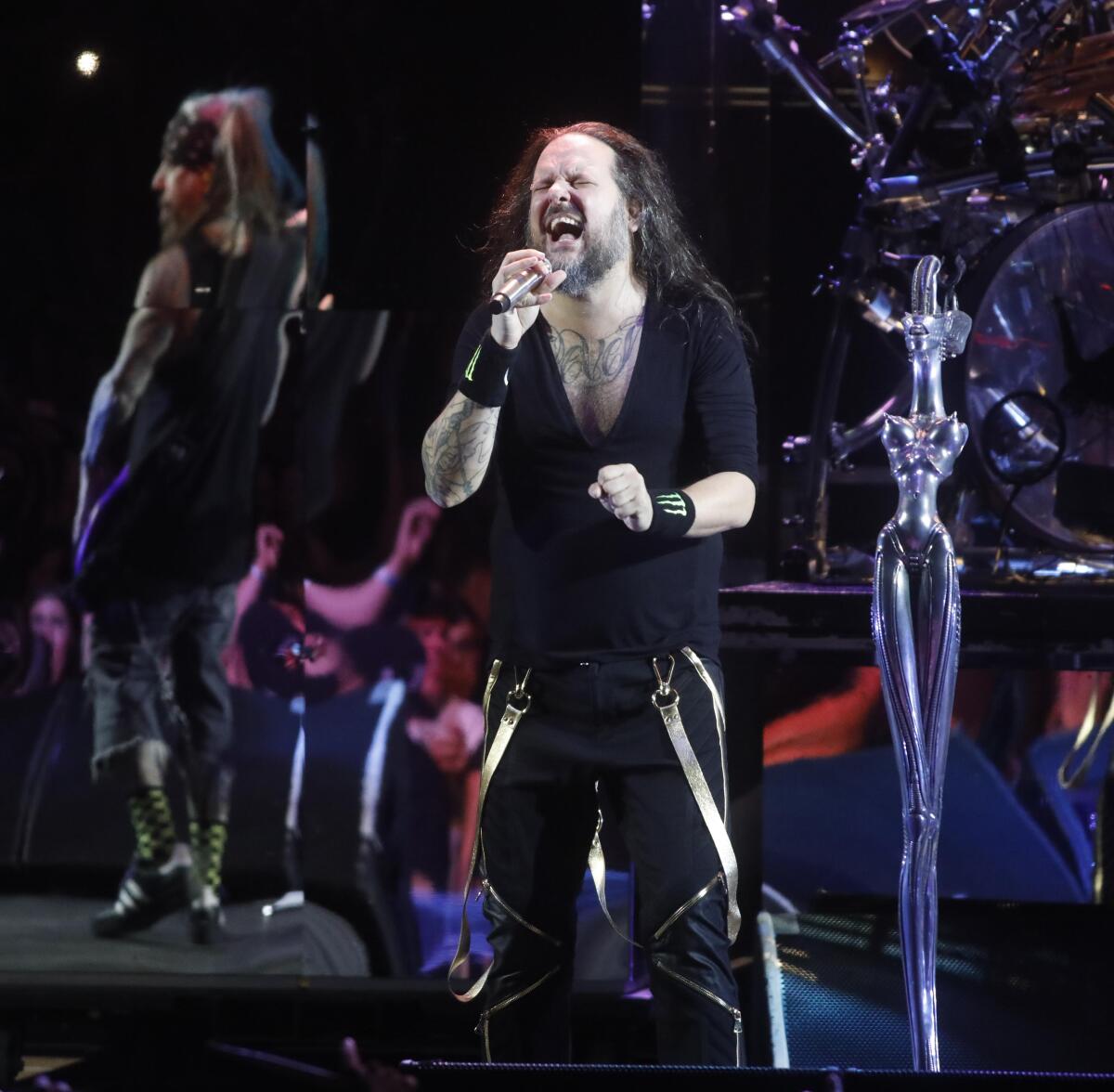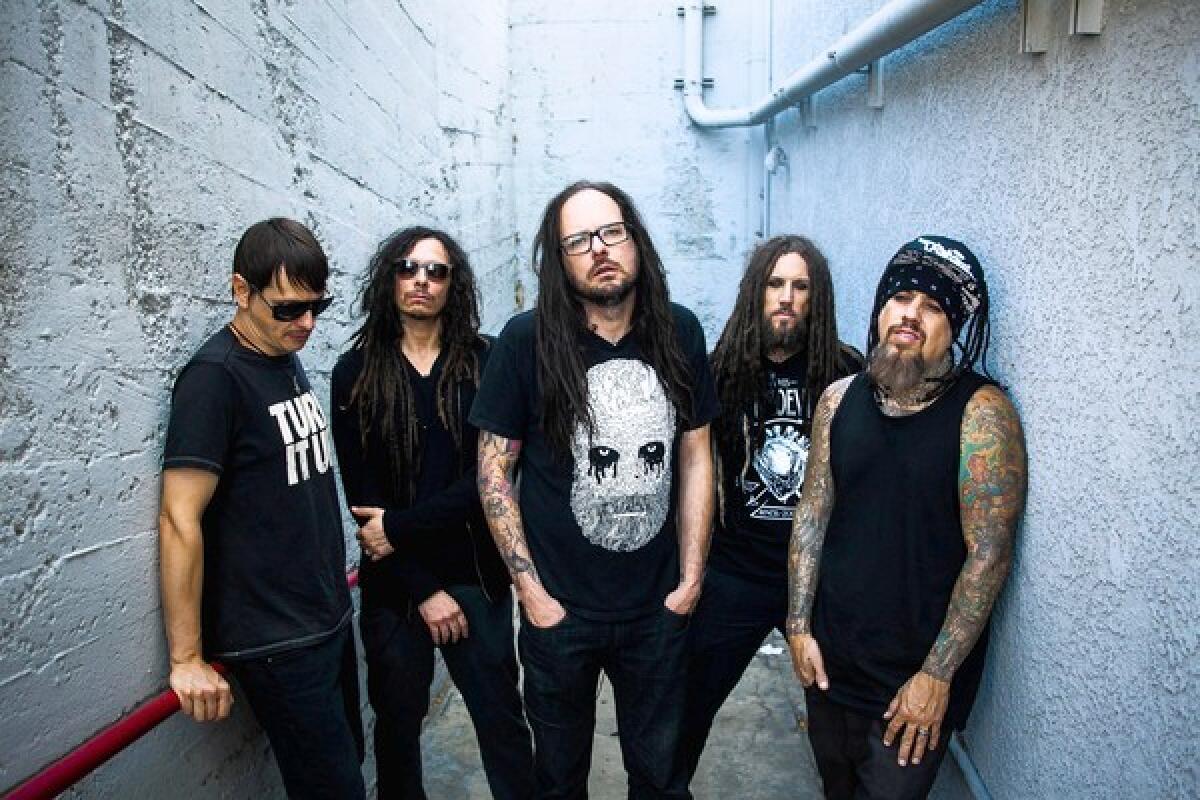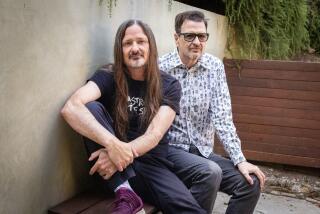With new fans aboard, Korn shows how to metal in middle age

At the FivePoint Amphitheatre in Irvine in late August, the SoCal metal band Korn walked offstage from its sold-out co-headline set with Alice in Chains. The five members were sweaty but relaxed, freshly changed from their all-black denim and leather stage outfits into all-black sweatpants and T-shirts.
In a small trailer where they stashed their Chinese takeout and coconut water, guitarist James âMunkyâ Shaffer, 49, popped in for a beverage. Behind him, a 16-year-old guitarist gingerly followed, introducing herself to say she had been working on her own Korn-inspired chops.
âIâm here for my lesson, then,â Shaffer said, grinning.
âI got a seven-string guitar so I could play like you,â she said, pulling out her phone to show him an Instagram video of her rough-and-tumble rock band. She could, indeed, shred.
âNow youâre making me feel old,â Shaffer joked, as they took pictures for her friends back home.
For 25 years, Korn stood stalwart in metal, ânuâ or not (a genre they despise but have made peace with). Their then-radical sound incorporated goth, funk and hip-hop with blisteringly miserable lyrics. Disenchanted teens sent them up the album charts. Korn was ubiquitous on countdown video shows like âTotal Request Liveâ and the biggest stages of the era (including the calamitous Woodstock â99).

But after years of chugging along as a theater act and metal-fest fixture, the band has a fresh wind of relevance among Gen Z artists. Underground rappers like Denzel Curry, Ghostemane and Scarlxrd have embraced their bloodletting lyrics and scabrous noise. Even pop acts like Billie Eilish have put their own spin on Kornâs baggy, goth-rap fashion.
With a modern and painfully personal new album, âThe Nothing,â out this week â and a recent documentary about the bandâs struggles to rebuild family after tragedy â Korn is primed to take that old malaise to bigger and younger crowds than theyâve seen in a generation.
Kids can âsmell bull ... a mile away,â said singer Jonathan Davis, 48, after the show. âIf a band makes me feel something, Iâm down forever, and itâs hard to find that today. [The late â90s were ] a very potent time for American culture, when things were more real. Of course kids will pull from that.â
Korn, founded in nearby Bakersfield, was one of the biggest bands in the world in the late â90s, with the two No. 1 albums (1998âs âFollow the Leaderâ and 1999âs âIssuesâ) and seven more top-five albums. Songs like âFreak on a Leashâ and âGot the Lifeâ regularly did battle with Backstreet Boys, âN Sync and Britney Spears for âTRLâ dominance. But after a long, turbulent midperiod defined by heavy drinking and drug use, guitarist Brian âHeadâ Welch quit the band, turning to evangelical Christianity. (Heâd later keep the faith but return to the band in 2013).

The group turned to pop producers like the Matrix and heavy dubstep acts like Skrillex and Noisia to refresh their sound for the EDM era. Crowds dwindled. Nu metal, the genre theyâd reluctantly helped invent, became shorthand for the sins of toxic masculinity.
âWhen I came back, we were doing theaters,â Welch, 49, said. âI did think âWow, itâs not like it used to be,â but we held on and tried to just grow.â
Today, if you peruse Gen Z-beloved resale sites like Depop, youâll find dozens of âFollow the Leaderâ-era tour tees sold by fans who were barely alive back then. Rappers like Curry and the British throat-shredder Scarlxrd saw through nu-metalâs dated connotations to rediscover the power that lies at the center of heavy metal and rapâs rhythm. Eilishâs drapey-â90s fashion and fluency with rap beats, nightmarish imagery and digitally tangled vocals draw from Korn at its commercial peak.
The bandâs new album âThe Nothingâ is well timed to ride those tailwinds, a crisp refresh of their sound. Producer Nick Raskulinecz wrings deep and potent performances from the band, evoking their ever-present rage but also feelings of loss and isolation. Shaffer and Welchâs guitar work is tasteful and imaginative, and the rhythm section of bassist Reginald Arvizu and drummer Ray Luzier give the songs a contemporary swing and weight.
Korn has always traded in rage and fear and angst. But now itâs a different kind of self-loathing, because middle age has raised the stakes.
Last year, Davisâ estranged wife, Deven Davis, mother of his children Pirate and Zeppelin, died from a suspected drug overdose after long struggles with mental illness. Davis wrote at the time that âI loved her with ALL of my being⌠She was an incredibly nurturing, giving, loving, and hilarious person.â
âThe Nothingâ is his first music to grapple with that loss, and though itâs often alluded to rather than depicted, lyrics from âFinally Freeâ like âWhere are you now? / I tried to get through to you, nothing is saving you / How could I fail? / This life betrayed you, and you are finally freeâ show a singer grappling with perhaps the deepest, most confounding loss of his life. Sometimes it resulted in literal, live-to-tape tears in his Bakersfield studio.
âI went through hell last year and had to purge what I was going through and bring the listener through that experience,â Davis said. âI donât know how to explain it but it takes me over. When you hear me break down and cry, thatâs not fake. Itâs how I get it out. Some people go to a shrink. My music is that for me.â
Welch, meanwhile, starred in a well-received 2018 documentary, âLoud Krazy Loveâ about mending his relationship with his daughter Jennea. Rock stardom took a toll on him as a dad, but sobriety and Christianity revealed other, more complex dynamics in their relationship that needed deep repairs. The documentary is a story of a father seeking redemption, and what it means for a daughter to trust again.
âIt was healing,â Welch said. âIt was really difficult but it made us closer. She could see me and the other Korn guys in our 20s, and sheâs like, âYou guys were just kids, you didnât know what you were doing and then you had babies yourself, and youâre trying your best but youâre a wreck, you know?â It really helped her forgive me.â
As Korn enjoys this unlikely resurgence, the band isnât planning on changing how they work. Maybe they end up on a Coachella bill, but as their aesthetic has waxed and waned in pop culture, perhaps all they had to do was wait until a new class of fans rediscovered them. Teen angst has never gone out of fashion, after all.
âWeâre almost 50 and we just sold this place out,â Welch said. âJonathanâs lived every one of these lyrics. This generation can smell a phony a mile away and heâs not a phony.â
More to Read
The biggest entertainment stories
Get our big stories about Hollywood, film, television, music, arts, culture and more right in your inbox as soon as they publish.
You may occasionally receive promotional content from the Los Angeles Times.











